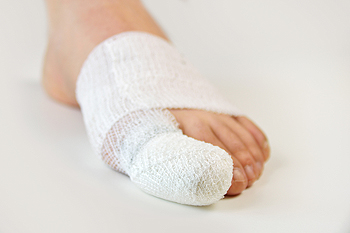6650 Frankford Ave
Philadelphia, PA 19135
 You may have broken your toe if you dropped a heavy object on it or hit it on a piece of furniture and it hurts – sometimes so bad you cannot move the toe. This can also happen if you play sports and injure your toe. Most of the time if you break a toe, it should be taped to the toe next to it and you should stay off the foot as much as possible until it feels better. This is not the case if the broken bone protrudes from the skin, more than one toe is affected, or you think you broke your big toe - as more treatment is necessary. Broken toes at the end of the foot, such as the pinkie or big toe, tend to be more painful because more pressure is put on them when walking and they are more likely to swell. As blood and liquid collect at the site of the broken toe it will start looking bruised, it may appear deformed like it is no longer lining up with other toes, and/or it can feel weak. It is very important to seek the counsel of a podiatrist if you suspect you have a broken toe. As mentioned, certain situations are worse than others so it is suggested that a podiatrist take an X-ray for a proper diagnosis, and then a corresponding treatment plan can begin.
You may have broken your toe if you dropped a heavy object on it or hit it on a piece of furniture and it hurts – sometimes so bad you cannot move the toe. This can also happen if you play sports and injure your toe. Most of the time if you break a toe, it should be taped to the toe next to it and you should stay off the foot as much as possible until it feels better. This is not the case if the broken bone protrudes from the skin, more than one toe is affected, or you think you broke your big toe - as more treatment is necessary. Broken toes at the end of the foot, such as the pinkie or big toe, tend to be more painful because more pressure is put on them when walking and they are more likely to swell. As blood and liquid collect at the site of the broken toe it will start looking bruised, it may appear deformed like it is no longer lining up with other toes, and/or it can feel weak. It is very important to seek the counsel of a podiatrist if you suspect you have a broken toe. As mentioned, certain situations are worse than others so it is suggested that a podiatrist take an X-ray for a proper diagnosis, and then a corresponding treatment plan can begin.
A broken toe can be very painful and lead to complications if not properly fixed. If you have any concerns about your feet, contact John M. Fanelly, DPM from Northeast Philadelphia. Our doctor will treat your foot and ankle needs.
What to Know About a Broken Toe
Although most people try to avoid foot trauma such as banging, stubbing, or dropping heavy objects on their feet, the unfortunate fact is that it is a common occurrence. Given the fact that toes are positioned in front of the feet, they typically sustain the brunt of such trauma. When trauma occurs to a toe, the result can be a painful break (fracture).
Symptoms of a Broken Toe
Generally, it is best to stay off of the injured toe with the affected foot elevated.
Severe toe fractures may be treated with a splint, cast, and in some cases, minor surgery. Due to its position and the pressure it endures with daily activity, future complications can occur if the big toe is not properly treated.
If you have any questions please feel free to contact our office located in Philadelphia, PA . We offer the newest diagnostic and treatment technologies for all your foot and ankle needs.